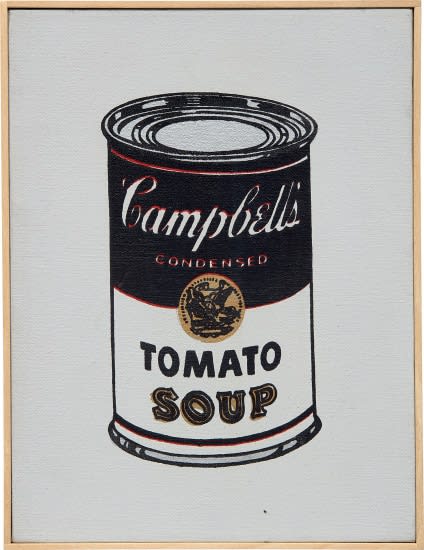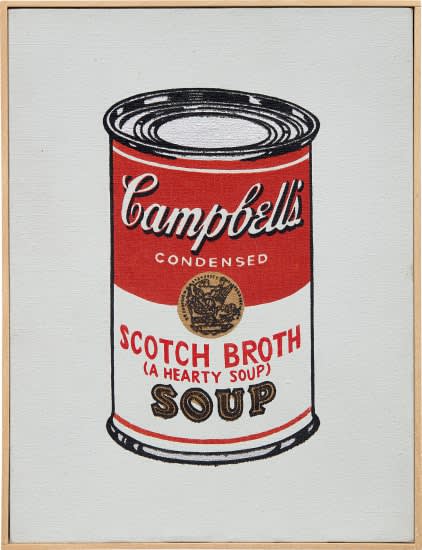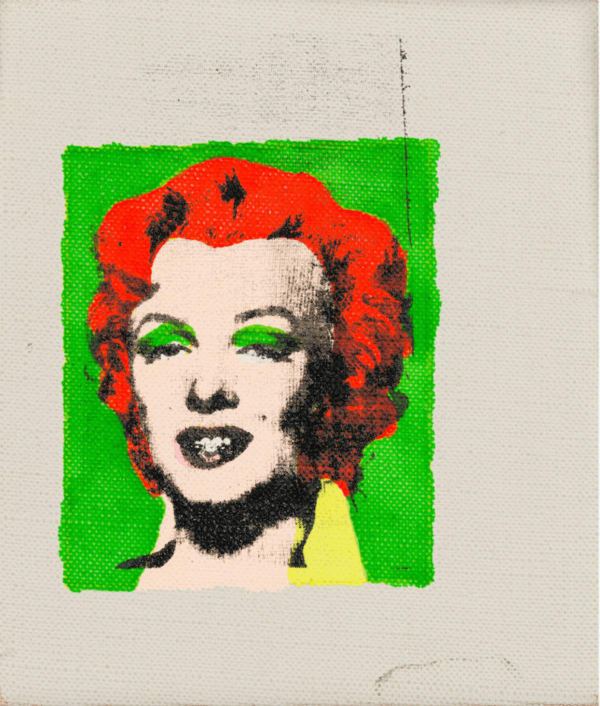In the intricate landscape of contemporary art, Richard Pettibone emerges as a pivotal figure whose appropriation art fascinatingly intertwines with Andy Warhol's iconic works. Pettibone's oeuvre, particularly his renditions of Warhol's Campbell's Soup, Elvis, and Marilyn series, offers a nuanced dialogue with the themes of mass production, celebrity culture, and the nature of art itself. This article explores Pettibone's distinctive approach to appropriation, examining how his recreations of Warhol's seminal pieces serve as both homage and inquiry into the fabric of Pop Art.
Warhol's Campbell's Soup Cans are emblematic of the Pop Art movement, transforming ordinary consumer goods into subjects of high art and critiquing the pervasive consumer culture of the 1960s. Pettibone, in his appropriation of these works, miniaturizes Warhol's original 32 canvases, inviting a closer, more intimate inspection. Through this act of replication and scale alteration, Pettibone underscores the notion of art as a consumable product, simultaneously questioning and celebrating the commodification process inherent in the art world. Pettibone's meticulous reproductions do not merely mimic; they probe the viewer's perceptions of originality and value, emphasizing the serial nature of Warhol's subjects and the paradoxical uniqueness of each replicated piece.
Warhol's depictions of Elvis Presley as a gun-slinging cowboy capture the confluence of fame, mythology, and Americana. Pettibone's reimaginings of these pieces further complicate the relationship between icon and audience. By appropriating Warhol's Elvis, Pettibone not only shrinks the physical dimensions of the work but also distills the essence of celebrity into even more concentrated forms. This reduction serves as a commentary on the diminishing gap between the viewer and the viewed, suggesting that the proliferation of celebrity images leads to a more intimate yet more detached understanding of the figure in question. Pettibone's Elvis series prompts reflections on the mechanisms of fame and the role of repetition in the construction of cultural icons.
Perhaps no other subject encapsulates Warhol's fascination with celebrity and tragedy as poignantly as Marilyn Monroe. Warhol's Marilyns, produced after her untimely death, are haunting portraits of the actress that blend glamour with a palpable sense of loss. Pettibone's appropriations of these works further intensify these themes through the act of miniaturization, making the images at once more accessible and more remote. By doing so, Pettibone not only pays tribute to Warhol's artistic vision but also to Monroe's enduring legacy as a figure of both beauty and sorrow. The small scale of Pettibone's pieces invites a personal engagement with the subject, transforming Warhol's public commentary into a private contemplation on fame, mortality, and the artifice of celebrity.
Richard Pettibone's appropriations of Andy Warhol's work transcend mere imitation, engaging in a sophisticated dialogue with the concepts at the heart of Warhol's art. Through his reinterpretations of the Campbell's Soup Cans, Elvis, and Marilyn series, Pettibone explores the boundaries between originality and reproduction, offering a critique that is both a continuation and a reevaluation of Pop Art's legacy. In doing so, Pettibone not only acknowledges the genius of Warhol but also asserts his own role in the ongoing conversation about the nature of art, its consumption, and its meaning in contemporary culture. Pettibone's work reminds us that art is not only about the object created but also about the context in which it is received and the conversations it engenders.
February 6, 2024
-
Selected Paintings for Sale by Richard Pettibone
-
 Richard Pettibone, Andy Warhol Flowers (Yellow), 1970
Richard Pettibone, Andy Warhol Flowers (Yellow), 1970 -
 Richard Pettibone, Andy Warhol Marilyn 1962 Green, 1978
Richard Pettibone, Andy Warhol Marilyn 1962 Green, 1978 -
 Richard Pettibone, Andy Warhol Marilyn 1962 Pink, 1978
Richard Pettibone, Andy Warhol Marilyn 1962 Pink, 1978 -
 Richard Pettibone, Andy Warhol Marilyn 1962 Purple, 1978
Richard Pettibone, Andy Warhol Marilyn 1962 Purple, 1978 -
 Richard Pettibone, Andy Warhol Campbell’s Soup Can, 1987
Richard Pettibone, Andy Warhol Campbell’s Soup Can, 1987 -
 Richard Pettibone, Andy Warhol, 'Scotch Broth Soup', 1962, 1986
Richard Pettibone, Andy Warhol, 'Scotch Broth Soup', 1962, 1986 -
 Richard Pettibone, Roy Lichtenstein, Seductive Girl after Roy Lichtenstein, 2009
Richard Pettibone, Roy Lichtenstein, Seductive Girl after Roy Lichtenstein, 2009 -
 Richard Pettibone, Warhol Flowers 1964 (Blue), 1970
Richard Pettibone, Warhol Flowers 1964 (Blue), 1970 -
 Richard Pettibone, Warhol Flowers 1964 (Pink), 1970
Richard Pettibone, Warhol Flowers 1964 (Pink), 1970
-













